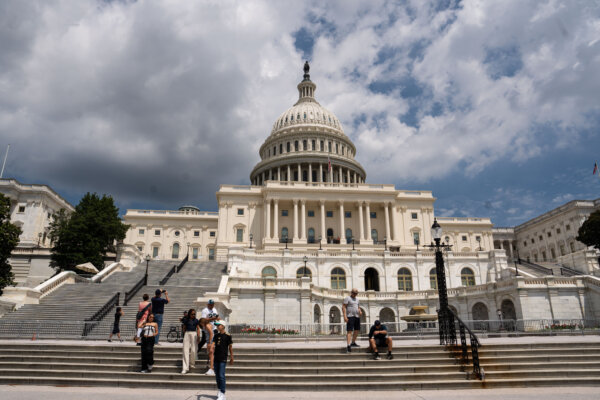![]() WASHINGTON—The House of Representatives on July 3 passed the One Big Beautiful Bill Act to implement President Donald Trump’s agenda, sending it to the president’s desk.
WASHINGTON—The House of Representatives on July 3 passed the One Big Beautiful Bill Act to implement President Donald Trump’s agenda, sending it to the president’s desk.
The bill cleared the House in a 218–214 vote, following an all-night session as Republicans scrambled to win over holdouts who had derailed an earlier attempt to advance the 940-page measure.
The bill will head to Trump’s desk ahead of a self-imposed July 4 deadline. The legislation enacts many of Trump’s domestic policy initiatives, including tax cuts, boosting spending for the border and defense, and phasing out clean energy tax credits.
The passage marks a major victory for Republican leadership and Trump, who had to contend with a diverse group of holdouts who objected to the Senate’s version of the bill for various reasons, including its effect on the deficit and deeper cuts to Medicaid.
Ultimately, two Republicans—Reps. Thomas Massie (R-Ky.) and Brian Fitzpatrick (R-Pa.)—joined all Democrats to vote against the bill.
Speaking after Jeffries, House Speaker Mike Johnson (R-La.) jokingly put a big binder on his lectern, a reference to what the Democratic leader was reading from during his hours-long speech.
“This day is a hugely important one in the history of our nation,” Johnson said.
Overnight Whip Effort
A procedural measure, known as a rules vote, was held open for more than five hours overnight as it was locked in a 207–217 vote. Five Republicans had voted against advancing the bill, with eight other Republicans not voting and withholding their support.
This occurred after an earlier procedural vote was held open on the floor for a record seven and a half hours as leadership sought to build support for legislation behind the scenes.
Speaking to reporters at about 1:45 a.m. ET, Johnson blamed the breadth of the Senate changes to the bill for the difficulties.
“We will make our July 4th deadline, which everybody mocked when I said it,” Johnson added, referencing Trump’s request that Congress pass the bill by Independence Day.
Four conservatives—Reps. Keith Self (R-Texas), Victoria Spartz (R-Ind.), Andrew Clyde (R-Ga.), and Massie—had initially voted against advancing the bill, along with Fitzpatrick, a moderate.
Ultimately, four Republicans flipped their vote to yes, and the eight abstaining Republicans also voted yes. Fitzpatrick was the sole Republican to vote against advancing the bill.
Lawmakers advanced the measure at around 3:30 a.m. ET.
Rep. Bob Ondar (R-Mo.), who had initially abstained from the vote to advance the measure, told The Epoch Times at around 3 a.m. ET that the Trump administration had persuaded him to support the bill.
Medicaid
Democrats have universally decried the bill’s tax provisions, focusing primarily on its potential impact on Medicaid, but the bill’s Medicaid provisions were also a key issue for many House moderates.
The bill includes measures aimed at reducing federal spending on Medicaid, in part by more strictly verifying enrollees’ eligibility and requiring able-bodied, childless adults to work or perform community service for 20 hours per week.
Comments to the press from Rep. Dusty Johnson (R-S.D.), chairman of the moderate Main Street Caucus, indicated that a White House meeting on July 2 was effective in getting moderates on board with the package.
When asked about the meeting, Johnson said that Trump and Centers for Medicare & Medicaid Services Administrator Dr. Mehmet Oz “did a good job of working through some of the specifics,” referencing moderates’ concerns about how the bill would affect Medicaid in practice.
“The president is the best closer in the business, and he got a lot of members to ‘yes’ in that meeting,” he said.
Members of the “SALT Caucus”—a coalition of mostly New York and California Republicans pushing for an increase to the state and local tax (SALT) deduction cap in the bill—seemed generally satisfied with the Senate provision raising the cap to $40,000 for 5 years.
Rep. John McGuire (R-Va.), a supporter of the bill, said that Republican changes to the currently “unsustainable” program will ensure that it’s “available for people who need it for future generations.”
Rep. Greg Murphy (R-N.C.) told reporters: “We’re going after waste, fraud, and abuse. People shouldn’t be on the system who are not eligible.”
Some Republicans also had misgivings about the bill’s potential impact on Medicaid enrollees.
Sen. Lisa Murkowski (R-Alaska), a holdout who ultimately voted in favor of the Senate bill, said she did so that the House could improve it further.
“I have urged our leadership, I have urged the White House that more process is needed to this bill, because I would like to see a better outcome for people in this country,” Murkowski said.
Republicans have disputed the accuracy of that estimate.











